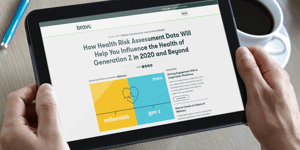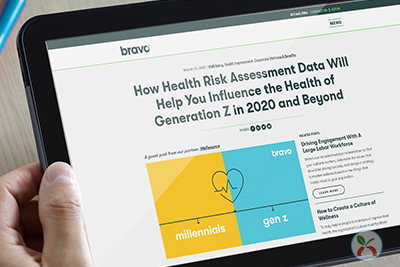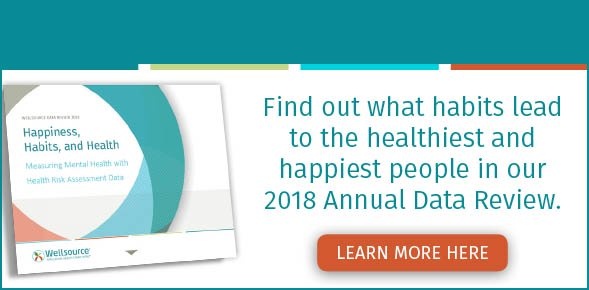This article from the Wellsource team originally appeared on the Bravo Wellness site - view the full article as it was originally posted here.

Change is on the horizon for the wellness industry. More Baby Boomers will retire, giving Millennials and Generation Z (Gen Z) more prominence.
The youngest generation—born 1997 and onward—will change the face of wellness, the workplace, and the world. Generation Z has surpassed Millennials in population size, and they have already entered the workforce. They are digital natives and expect that the workplace will meet their wellness needs using technology.
But there’s more to this generation than smartphones and TikTok. They are driven to change the world — and with health risk assessment (HRA) data, you can help them stay healthy so they can. Here are some significant ways HRAs can help wellness professionals meet the needs of Gen Z in 2020 and beyond.
They have higher rates of depression and stress. HRAs identify who’s at risk.
Overall, Americans are more depressed today than they were five years ago. According to a 2018 Blue Cross Blue Shield study, the incidence of major depression increased 33% since 2013. And the group most likely to be diagnosed with major depression? You guessed it: Gen Z.
Wellsource reviewed 2018 data from its health risk assessment product* and found some staggering data about the Gen Z workforce. This generation is nearly two times more likely to feel depressed than older generations. Fewer than half (45%) of Gen Zs rate their mental health as very good or better, and nine in ten report having at least one stress-related symptom. So what’s stressing out Gen Z?
- Finances. True, Gen Zs aren’t the only generation buried by personal debt—Generation X has the highest student loan debt load, for example—but four in five Gen Zs are stressed out about money. Our HRA data* shows that 68% of Gen Zs have some level of financial stress. Saddled with school loans and sky-high housing costs, many Gen Zs report stress over not getting enough to eat. However, they are being proactive about their future stability. More than half of Gen Zs already have a savings account.
- Work. Close to eight in ten Gen Zs say work is a significant source of stress. In our HRA data*, 82% said they had some level of work stress. Gen Zs are entering the workforce already stressed, but once there, 77% cite work as a cause of their stress.
HRAs can help wellness professionals spot psychological distress. They can also identify whether an individual has habits in place that contribute to coping, such as physical activity and social connection. In addition, apps can help people successfully engage in behavior therapy and connect with mental health coaches and therapists.
They have a strong interest in authentic social connection. HRAs let you see who’s connected.
Gen Zs are the most Internet-connected of all generations, but having a lot of online connections doesn’t necessarily make them happier. Heavy internet use increases the chances that a Gen Z has limited face-to-face communication with family, fewer friends, and greater feelings of loneliness and depression. Gen Z (and Millennials, too) are longing for something more—genuine connection—IRL (in real life) and online.
Use HRA data to confirm social support, such as whether an individual has frequent contact with friends and loved ones. And then, be more open to workplace initiatives that support connection. The majority (71%) of Gen Z workers want coworkers to be a second family, and nearly nine in ten want to work in a fun, social workplace.
Another approach to creating social opportunities for coworkers that will resonate with younger generations is to adopt a meaningful cause. Volunteer at a charity. Embark on a project to improve the environment. Adopt eco-friendly practices throughout your organization. Millennials want high-paying jobs, yet young workers are so driven to make a positive impact that three in five would take a cut in pay to work for a socially responsible company.
They have rapidly declining health. HRAs show you which habits put them at risk for chronic disease.
Gen Zs value wellness, but don’t equate that with traditional health care services. They have a difficult time finding a primary care physician that meets their needs and tend to prefer telemedicine and walk-in clinics.
According to our HRA data*, Gen Zs are less likely to use sunscreen, get regular physical or dental exams, or eat enough fruits and vegetables compared to older generations. They also sit for more hours a day than prior generations. Additionally, because they have high stress rates, they are at increased risk for health problems such as diabetes, high blood pressure, and increased sick days. And diseases like these are already stressing out your workforce. About three in five privately insured Gen Zs worry they or someone they love will not be able to access or afford health care when they need it in the future. Harness this worry to promote healthy behaviors.
In part two of this article, we will explore some of the stats surrounding health Habits of Gen Z, and the expectations they have of wellness offerings.
Interested in learning more about HRA data and what it tells you about a population's mental, social, and emotional health? Read our 2019 report, Happiness, Habits, and Health: Measuring Mental Health With Health Risk Assessment Data.
*Based on de-identified data from the WellSuite® IV Health Risk Assessment for the Workforce completed between January 1, 2018, through December 31, 2018.








